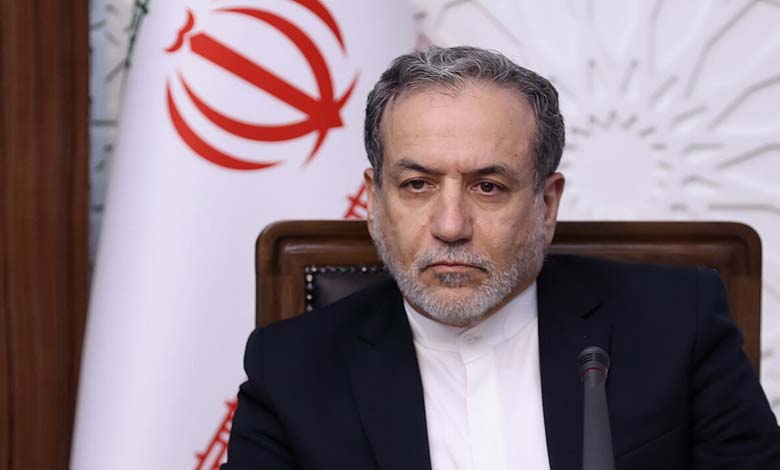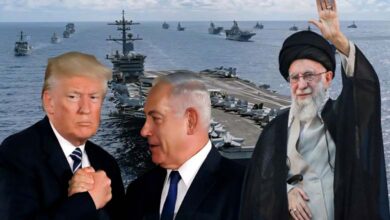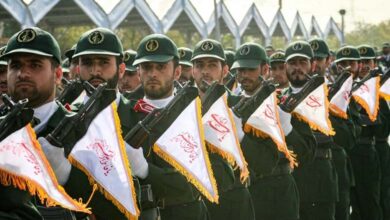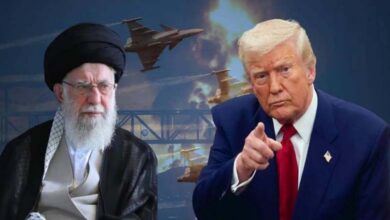Washington Targets Tehran with Harsh Sanctions as Araghtchi Demands War Reparations

New sanctions focus on the shipping assets of Mohammad Hossein Shamkhani, son of Ali Shamkhani—advisor to Supreme Leader Khamenei—and are expected to make Iranian oil sales “much more difficult.”
-
Pekaks: The Mountain Hiding Iran’s Nuclear Bomb
-
Energy Investments: Iran’s New Card to Woo Trump and End Sanctions
Iranian Foreign Minister Abbas Araghtchi has stated that the United States must compensate Iran for damages sustained during last June’s conflict, as Tehran hardens its stance and introduces new conditions for resuming nuclear talks with President Donald Trump’s administration. His remarks came alongside Washington’s announcement of a new sanctions package against Iran.
Speaking to the Financial Times on Thursday, Araghtchi said, “They need to explain why they attacked us in the middle of negotiations, and they must ensure it doesn’t happen again. They must also compensate for the damage they caused.”
-
Trump’s Pressure Pushes Iran to Accept U.S. Demands on Nuclear File
-
Iran Threatens to Carry Out Strikes in the Kurdistan Region
According to the report, Araghchi and U.S. special envoy Steve Witkoff exchanged messages throughout the conflict. Araghchi emphasized the need for a “mutually beneficial solution” to resolve the long-standing dispute over Iran’s nuclear program.
He told the newspaper that Iran requires concrete trust-building measures before any return to talks, including financial compensation and assurances that it won’t be attacked again during negotiations.
-
Iran executes former deputy defense minister despite Western warnings
-
Iran Drives Istanbul Nuclear Talks into a Deadlock
Last month, the U.S. launched airstrikes on Iranian nuclear sites, claiming they were part of a weapons development program. Iran has consistently maintained that its nuclear program is solely for peaceful purposes.
On Wednesday, the U.S. Treasury Department announced new sanctions against over 115 individuals, entities, and vessels linked to Iran, signaling the Trump administration’s renewed push for “maximum pressure” following the June strikes on key nuclear infrastructure.
-
Iranians Feel Unsafe After the 12-Day War
-
After signaling the snapback mechanism: Iranian-European talks scheduled for Friday in Istanbul
The sanctions primarily target the maritime assets of Mohammad Hossein Shamkhani, son of Ali Shamkhani, a senior advisor to Supreme Leader Ayatollah Ali Khamenei. The Treasury described the measures as the most significant since 2018, during Trump’s first term.
According to the Treasury, Shamkhani controls a complex network of container ships and tankers via intermediaries that facilitate the sale of Iranian and Russian oil and goods across global markets. He is accused of leveraging personal ties and corruption in Tehran to amass tens of billions of dollars, much of which supports the Iranian regime.
-
Adulterated Fuel Halts Iran’s President’s Trip… and a Taxi Saves the Day
-
Iran Has Not Set a Date or Location for Potential Nuclear Talks with Washington
In total, the sanctions affect 15 shipping companies, 52 vessels, 12 individuals, and 53 entities across 17 countries, from Panama and Italy to Hong Kong.
A senior U.S. official said the new actions will make it “much harder” for Iran to sell oil but expressed confidence they will not cause long-term disruptions in global markets. Iranian oil exports have already fallen from 1.8 million barrels per day at the start of the year to about 1.2 million now, partly due to earlier sanctions.
-
Talks with the US on the nuclear file?… Iran responds
-
Washington Reveals Iranian Plan to Close Strait of Hormuz During War with Israel
“We continue taking steps to reduce that number further,” the official said, recalling that similar sanctions during Trump’s first term slashed Iranian oil flows to just a few hundred thousand barrels per day.
Foreign Ministry spokesperson Esmaeil Baqaei called the sanctions “a blatant act of hostility against the Iranian nation,” according to the Iranian Students’ News Agency (ISNA). He said the oil restrictions are a “malicious act intended to damage Iran’s economic development and the well-being of its people.”
-
Washington denies transfer of Iranian enriched uranium before U.S. strike
-
Trump Administration Defends Strikes on Iran as Leaked Report Puts Success Under the Microscope
The European Union imposed its own sanctions on Shamkhani earlier in July, citing his role in facilitating Russian oil trade.
China remains Iran’s largest oil buyer. A U.S. official acknowledged the measures impact both Iran and Russia but are primarily focused on Tehran.
“Given this individual’s position, his ties to the Supreme Leader, and his father’s history with past sanctions… it’s critical to underscore that this action is Iran-focused and highly impactful,” said the official. Ali Shamkhani was previously sanctioned by the U.S. in 2020.
-
Iran Faces the Battle Alone… Where Have Its Proxies Gone?
-
Sources Reveal Shocking Pentagon Intelligence Report on Iran’s Nuclear Program
This latest announcement comes amid slim prospects for renewed diplomacy following last month’s U.S. strikes on Iranian nuclear facilities.
On Monday, Trump warned that any attempt by Tehran to restart its damaged nuclear sites would trigger fresh U.S. attacks. “Iran is sending bad signals,” he told reporters, adding that any such attempt “will be crushed immediately.”
-
A Major Escalation in Iranian Attacks: Multi-Warhead Missile Strikes Deep Inside Israel
-
US Strike on Iran Closer Than Ever
The U.S. had held five rounds of talks with Iran prior to the June airstrikes, which Trump claimed “obliterated” what Washington and Israel assert is a nuclear weapons program. However, some experts question the extent of the damage, and Iran denies seeking nuclear weapons.
A senior White House official said last week that Washington remains open to direct talks with Iran. Yet European and Iranian diplomats alike say there is little chance of negotiations resuming under current circumstances.
-
One Week into War: Iran Expands Its Strikes on Israel with the Largest Rocket Barrage in 48 Hours
-
Iran Tests Trump’s Principles—Will He Fall Into the Trap His Predecessors Warned Against?
-
Hypersonic Missiles and Strikes on Nuclear Facilities: Day Six Between Iran and Israel












